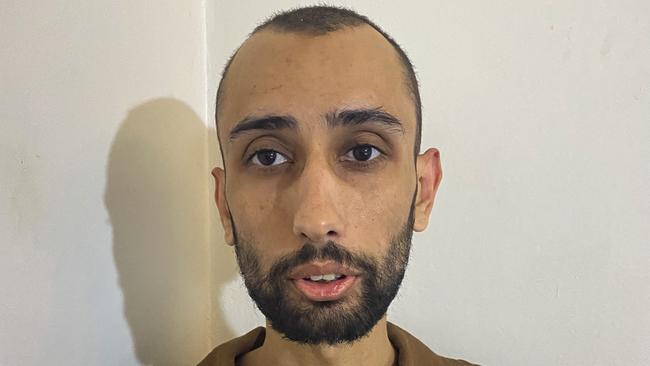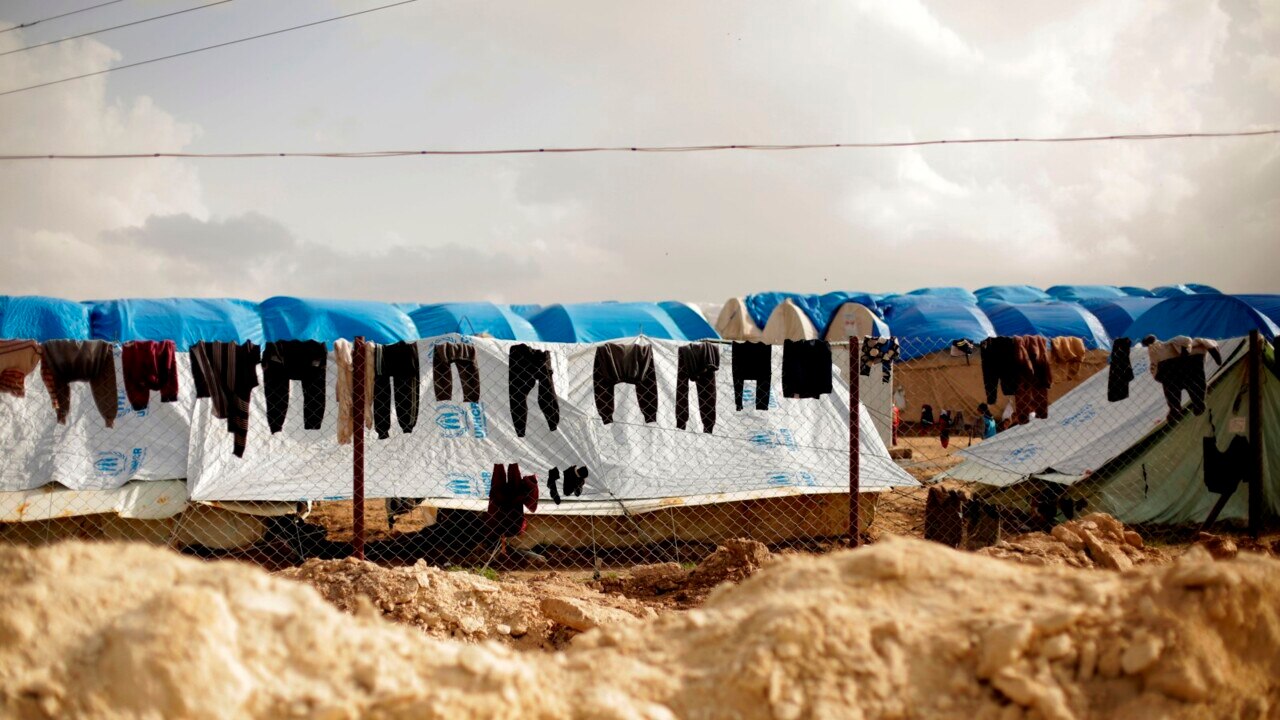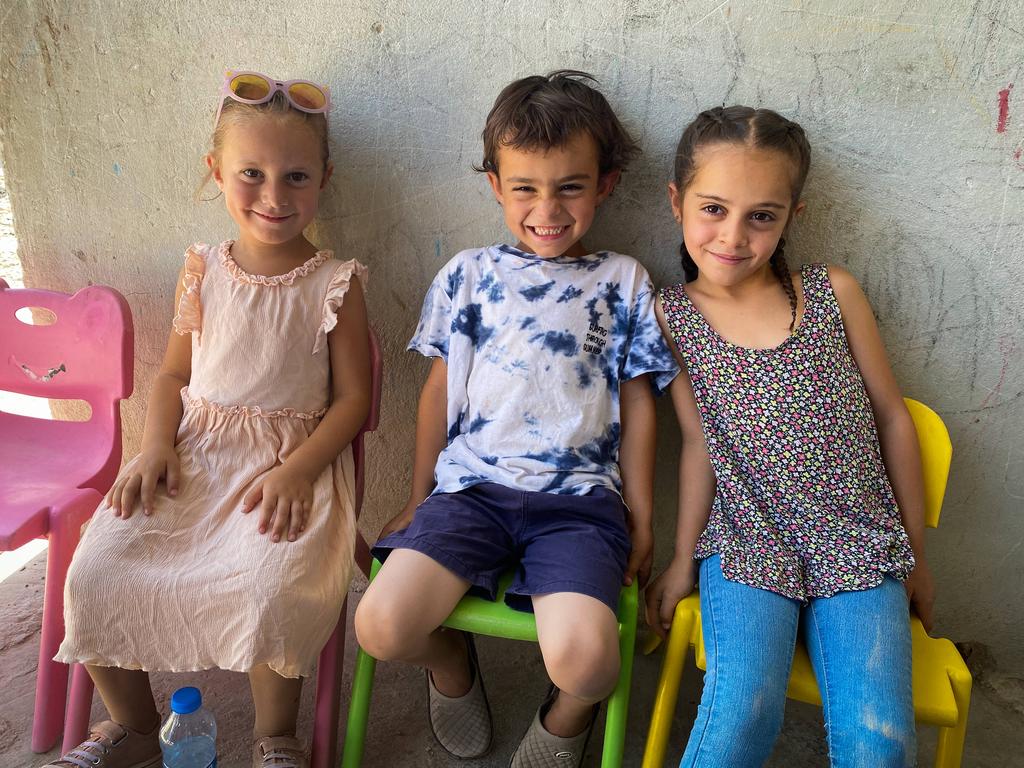Young ISIS fighter and father Deniz Hasan ‘sorry’ and wants to come home
An Australian Islamic State fighter unknown to the public has been revealed, 3½ years after he was secretly detained in a prison in northeast Syria.

An Australian Islamic State fighter unknown to the public has been revealed, 3½ years after he was secretly detained in a prison in northeast Syria.
Deniz Hasan, 27, of Melbourne, has been locked up in the city of Hasakah since handing himself in when Islamic State surrendered in March 2019.
Hasan’s Danish wife Sara Nobakhti-Afshar and two of his children, Kadija, about five years old, and Ibrahim, about three years old, are also alive and detained in a prison camp for Islamic State families. The children are Australian citizens.
A third child, Abdul Rahman, was tragically killed at the age of just two years after being shot in the head at Islamic State’s last stand in the town of Baghouz in March 2019. Hasan was holding the child in his arms when the fatal shot was fired, apparently by a Syrian regime soldier.
Identified by The Australian during a prison visit in August, Hasan initially claimed he had never been a member of Islamic State and that he had lived as a free man in ISIS territory because he kept a low profile and associated only with Syrians.
He later admitted he fought for Islamic State in Damascus, was issued with an Islamic State Kalashnikov, was paid $50 a month by the terror group and had undergone military training at a camp near IS headquarters in Raqqa.
And while he maintained that he didn’t know “many Australians’’, it can be revealed that in fact he was an associate of the “tinnie terrorists’’ – a group of men jailed after a bumbling attempt to take a boat from Melbourne to The Philippines in 2016.
The Australian government and law enforcement have known for years that Hasan was detained along with at least 11 other Australian men and boys in northeast Syria. In 2015, he was caught by terrorism investigators on phone intercepts talking with some of the Melbourne-based tinnie terrorists.
Hasan, who attended a private school in Melbourne before leaving the country in 2014, said he now regretted travelling to Syria, and that he had hadn’t been able to contact his parents, who were deaf, in nine years.
In a lengthy interview at a prison location in Hasakah which cannot be revealed publicly, an emaciated and unwell Hasan at first told The Australian he had gone to Syria via Turkey sometime between June and August in 2014 and worked for a Danish charity whose name he claimed he could not recall.
He falsely claimed he never became involved in Islamic State and instead went to Raqqa where a local family helped him out with housing and living expenses, and he had lived as a “normal citizen’’.
“I didn’t know many Australians. Syrians helped me with this. Syrians had families living in Aleppo that I knew from before, when I was a part of the charity organisation,’’ he said.
In an exchange with The Australian, he was asked if he was ever a member of Islamic State.
He replied: “No.’’
“Never?” he was asked.
“No.’’
“So how was it that Islamic State let you live as a free citizen then?” he was asked.
“They let a lot of the foreigners live as free citizens. Also I didn’t really mix with foreigners, so I wasn’t really known. A lot of Syrians were the ones who helped me live, money-wise, clothes, everything. Even moving around. I didn’t meet up with much problems because I blend in with the crowd.’’
But after a conversation with the Syrian Democratic Forces prison guard sitting in on the interview, Hasan admitted he had not told the truth, saying he was concerned about the legal repercussions. He agreed to a second interview to correct the record.
Compulsory to join
In both versions of his life story, Hasan said he had worked with the unnamed Danish organisation before being arrested and jailed for about six months by the Free Syrian Army, a rival opposition militia in Syria. He then admitted he had joined Islamic State.
Born to Turkish Cypriot parents in Melbourne, he said he was an Australian citizen who spoke English and a smattering of Turkish, but picked up Arabic “pretty fast’’ while in prison.
“When I left Australia and came to Syria through Idlib, I did help out with a charity organisation for about two months and then I was imprisoned by FSA. They claimed I was ISIS. Also because I was a foreigner as well,’’ Hasan said. “After being in prison for six months, from FSA, I went to ISIS area, with encouragement from FSA. I chose, with encouragement from FSA. “
Hasan moved to Islamic State’s de facto Syrian capital of Raqqa.
“From there I joined ISIS, it was compulsory to join.
“When I joined they sent me to Damascus. I did most of my time in Damascus. Until it became, how do they call it, a state of emergency, in Aleppo, when the regime started to make movements in Aleppo. They (Islamic State) called for reinforcements so they sent me to Aleppo. I worked in Aleppo for two or three months.’’
Military training
He said he had problems with his immediate superiors in Islamic State, who had assigned him to work at “standing post’’ – apparently standing watch at the border.
He claimed he wasn’t fighting, but was “like a fighter, on the borders, stopping the enemy entering, this is what I was doing in Damascus and Aleppo.’’
Hasan admitted he had gone to a military training camp somewhere outside Raqqa and learned how to use the Russian-made automatic Kalashnikov rifle Islamic State had given him.
“They don’t really teach you much,’’ he said.
He was paid $50 in US currency a month for his work, and given an allowance of another $50 for his wife, and $20 for each child.
Hasan said he fell out with his superiors over their demands he stand firm against heavily armed regime solders.
He said he had wanted to leave the group but had no money to pay the people-smugglers.
“They would order things that were just impossible. For example they would order you to stand post here and regime would move forward and it’s impossible to stay because they had too much equipment and they would come with tanks and everything and you’re going to get killed. But if you retreat, they would try to punish you. So for retreating they’d punish you … I didn’t like this treatment.’’

As a result, he claims he obtained false papers and moved between checkpoints to Mayadin, eventually ending up in Baghouz, Islamic State’s last redoubt, which fell under a sustained attack by the mainly Kurdish, Coalition-backed Syrian Democratic Forces, in March 2019.
Hasan married Danish-Iranian woman Sara Nobakhti-Afshar in the Idlib/Aleppo area. He said he met her through “a brother’’ who also had a Danish wife, although Danish media has reported that Nobakhti-Afshar met her Australian husband online before they both moved to Syria.
Hasan said he didn’t know where his wife and two children were. I don’t know. I’ve been three years and a half without them, I wish I knew, I wish I knew.’’
The Australian later confirmed they had been in the al-Hol camp, less than an hour away from the prison, among 60,000 others, mainly women and children linked to Islamic State members. There are unconfirmed reports they may have been moved with other Danish women to al-Roj.
Nobakhti-Afshar has refused media interviews but was recorded telling her family that she and her children were fine.
She has told a third party she is interested in coming to Australia with the children although it is unlikely the Australian government would consider that under any circumstances. She is not part of the group of 16 women and 42 children being considered for potential repatriation and who are held several hours away at al-Roj camp.
“They have the right to come to Australia,’’ Hasan said of his children.
Second Syrian wife
He said his wife was born in Denmark and was a Danish citizen. He said she had surrendered before him at Baghouz after their son was shot.
“He was killed … He was shot in the head. I was holding him. From the regime. Across the river. I was near the water, and after he was shot my wife gave up. She said ‘I can’t do this’.
“Even before that I was looking at sending out my wife,’’ he said.
Hasan said he had also taken a Syrian woman as his second wife in Aleppo, but the relationship didn’t work out and they had separated. While she had children, he said they were not his.
Danish media has reported Nobakhti-Afshar has had her Danish citizenship stripped but this has not been confirmed by the Danish government.
Danish TV2 journalists travelled to al-Hol camp in 2020 with Sara Nobakhti-Afsar’s mother and sister and broadcast a documentary on how she came to be in Syria. The family members said she had vanished from Denmark at the age of 19 without telling her family where she was going.
Her parents were born in Iran but Sara and her sister were born in Denmark, and religion did not play a defining role in their lives. But after Sara turned 18, she began observing Ramadan, then started wearing a hijab, spending hours on the computer and becoming more and more conservative. Then she met Deniz Hasan online.
In April 2015, she packed a bag and told her family she was going to visit a friend. When she didn’t come back, her family contacted police. Eventually, Sara texted them and said she was safe. They assumed she was in Turkey but she was in fact in Syria. Then she stopped contacting them on WhatsApp. Months later, in October 2019, they found out she had been detained in a prison camp.

Terrorist phone calls
Born at Sunshine Hospital in Melbourne’s western suburbs on November 7, 1994, Deniz Hasan attended Sydenham Primary School, then went to Mowbray College, a private school in Melbourne, before finishing his high school years at Caroline Springs.
He trained as a bricklayer although didn’t complete his apprenticeship, and left for Syria in June 2014 when he was 19.
Although he told The Australian he didn’t know “many other’’ Australians in Syria, a court had heard he was in contact with Australian would-be jihadis at home.
The tinnie terrorists were a group of six men led by self-stated Islamic State preacher Robert “Musa’’ Cerantonio, who were jailed for a failed plot to overthrow the Philippines government and install Islamic law there.
Cerantonio, Paul James Dacre, Antonino Alfio Granata, Shayden Jamil Thorne and brothers Kadir and Murat Kayas were jailed in 2019 for the 2016 plot, which saw them buy a boat and tow it from Melbourne to Queensland, not knowing they were being followed by anti-terrorism police.
In 2018, the Supreme Court of Victoria heard a bail application from Granata, which heard that on April 30, 2015, investigators had intercepted a conversation between Murat and Kadir Kaya, Granata and Deniz Hasan.
“Mr Hasan departed Australia on 18 June, 2014 for Turkey, where investigators suspect he subsequently joined the Islamic State,’’ judge Michael Croucher noted.
“The four men discussed “hot spots” in the vicinity of the Turkish/Syrian border, the likely difficulties in getting across the border and the best way of safely facilitating a female associate’s travel from Istanbul to the Syrian border region.

“Murat Kaya also indicated that he would organise her travel from Istanbul to Kayseri, then on to Hatay, near the Syrian border. Murat Kaya and Mr Hasan then discussed the latter’s recent military training with the Islamic State. Investigators allege that Murat Kaya was organising and facilitating the female’s transit to Syria in order to join the Islamic State,’’ Justice Croucher said.
He added that investigators again intercepted a telephone conversation between the same four men on June 7, 2015.
Hasan told The Australian he had initially supported Islamic State. But he said he no longer believed in the organisation or its ideology. “Of course not. Like I say, a lot of people saw the real thing of what Islamic State is.’’
Hasan said an “American psychologist’’ who visited him in prison in early 2020 had asked him if he wanted an Islamic state.
“I would want an Islamic state. As a Muslim I want a place where Islam can grow and I can live as a Muslim, but this organisation as the Islamic State is not what we want. We don’t want it to continue. We want it to end … there were a lot of things I didn’t support.’’
Breathing problems
Hasan said he was able to live his life as a Muslim in Melbourne, but “as a Muslim you want a full state for yourself – as a Muslim you want something that’s completely for you”.
Hasan suffers breathing problems, and has fluid in his lungs. “My health is not the best but I’m getting by,’’ he said.
He said he had heard from European inmates that ASIO had visited the Hasakah jails in 2019, but he had not seen them.
Anne Speckhard, the director of the International Centre for the Study of Violent Extremism and Adjunct Associate Professor of Psychiatry in the School of Medicine at Georgetown University in Washington confirmed she had interviewed Hasan in January 2020, when he had denounced Islamic State and agreed to appear on a counter-narrative video against the terror group.
He had given permission for his interview notes to be provided to Australian authorities.

‘What I did was a crime’
More than 2½ years after that meeting with Dr Speckhard, Hasan told The Australian he regretted travelling to Syria and that he understood he would face jail if he was returned to Australia.
“I know what I did was a crime,’’ he said.
“What is happening with our case? Are they going to take us back or not take us back? What’s happening with our case?
“Do you know anything about our case? Are they going to take us back? I’d like the Australian government to know that I regret coming to Syria.
“And that I think most people, after seeing what ISIS did, like after hearing in prison from a lot of Europeans and a lot of foreigners, that we regret coming to Syria.
“After seeing what ISIS did, it changed a lot of things.
“So I do regret coming to Syria.
“I’ll be honest. When I first came, my first two months when I was helping the charity organisation, I don’t regret that part because I felt I was doing good. But after that, coming into ISIS territory and living and thinking they were good at the start, that was not a good idea. I should have turned back to Australia instead.
“The FSA said to me ‘you’re a European, you’ve got to be careful of ISIS’. They gave me that warning. I didn’t listen.’’






